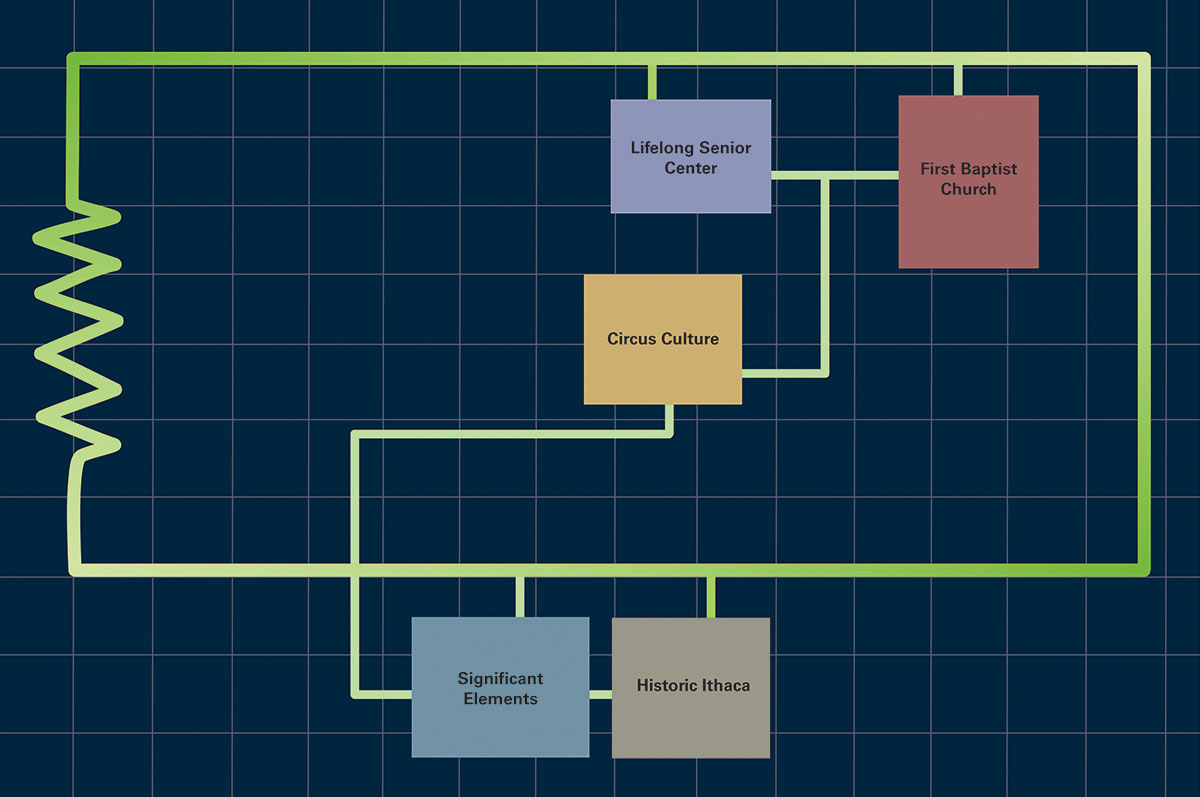The City of Ithaca announced Feb. 2 that the first “bloc” of buildings that have already been electrified or are in the process of being electrified have been identified.
First “bloc” of buildings
The announcement lists 11 buildings and businesses consisting of Gimme! Coffee, Significant Elements, Historic Ithaca, Ithaca Piercing & Tattoo, First Baptist Church, St. James AME, Lifelong Senior Center, the Aeroplane Factory, Circus Culture, Ithaca Area Wastewater Treatment Plant Administrative Building, Petrune and Home Green Home.
Savannah Vega, sustainability planner for the City of Ithaca, said there are 200 buildings in total that have been identified as the most notable buildings that were electrified. While the buildings are listed as being in the process of electrification, some of the buildings of the first “bloc” do not run on 100% electricity. Vega said some of the buildings instead have heat pumps — that heat and cool the buildings — which she said covers a bulk of the buildings’ energy needs. The heat pumps are the first transition away from natural gas.
“We need to put in the infrastructure in our buildings to create heating and cooling and hot water that doesn’t require natural gas that runs just on electricity,” Vega said. “So once we can get that infrastructure in place, that’s when we can start removing those gas lines and replacing the energy with renewed fully renewable sources like solar panels.”
Gas kicker program
Buildings like the First Baptist Church, located at 309 North Cayuga Street, applied for the “gas kicker” program in April 2023, which is part of the NYSEG Economic Development Heat Pump Incentive for Gas Constrained Areas pilot program to provide this financial aid when installing their heat pump. The gas kicker program provides the lion’s share of the conversion of the building from fossil fuels to electricity. Because every building uses a different amount of energy in heating and cooling, there is no set amount of emissions the conversion would redirect.
The incentive program was designed to provide a cap of $200,000 per project of financial aid for buildings to transition off gas powered technologies and begin using renewable energy sources instead.
Timeline and costs of the program
NYSEG released the incentive program in early April 2023, according to Ethan Bodnaruk, a project manager at BlocPower, which is a retrofit financing firm that works closely with the City of Ithaca to maintain the Ithaca Green New Deal. He said the program was slated to close several times in 2023, and initially closed April 30, 2023, making the deadline to apply tight for business owners. However, the program was reopened and officially closed Oct. 31, 2023. The NYS Clean Heat Program has reopened incentives for air-to-water heat pumps as of March 1.
The rebate program provides incentives for establishments to use renewable energy through NYSEG. David Caughey, a previous treasurer of the First Baptist Church, said the church was promised $180,000 in April 2023 from NYSEG to fund the project, but that the church first had to raise temporary funds to pay for the heat pump, its installation and an additional utility pole. While BlocPower did not manage the project because the church hired an outside company, the firm did file the application for the energy incentive to NYSEG on behalf of the church.
Incentives are calculated based on the cost differential between a heat pump and installing a new fossil fuel system, according to Bodnaruk. He said the incentive program suddenly made heat pump systems more affordable.
“So to pretend for a project, we came up with a design for both systems and the heat pump system, say it costs $150,000, but it would only cost $30,000 to replace the fossil fuel system with a new fossil fuel system,” Bodnaruk said. “So based on that difference, the incentive would be calculated at the difference of $120,000. So that way, you could get a heat pump system for the same cost as what it would take to replace your fossil fuel system.”
Caughey said that the entire project cost about $250,000 and that the church still had to pay $75,000. Caughey said that the installation process is still underway and that the church will be receiving the funds from NYSEG between three to six months after the project is complete.
“A lot of our members are at a stage in life where they have a fair amount of investment money here and there,” Caughey said. “So we decided to ask the members if they would give us loans for somewhat indefinite periods, somewhere between three months and a year to cover this expense. And from the day that we asked for that, we had $180,000 in less than a week.”
Necessity of BlocPower
Bodnaruk said the process of applying for incentive funding is not simple. He said utilities in the state have separate incentive programs for different types of work in the energy field and are managed by different companies. He said that helping businesses and establishments understand these incentives is where BlocPower steps in and to provide the services to complete the necessary paperwork for each incentive program.
“When you talk to contractors, you hear that it’s hard for them to keep up with all the different programs out there and if there’s a new program that might expire right away, there’s a lot of hesitancy to put in time to learn those rules,” Bodnaruk said.
Business and property owners need the services of BlocPower accessible to them since the information in the report to NYSEG is extensive. Bodnaruk said the data for the application consists of developing the scope of work for a heat pump system, the cost of the system and a scope and cost report of work for the fossil fuel replacement.
“So then once those numbers and that process was approved, you could start moving forward to actually make the contract … and get going on the project,” Bodnaruk said.
Vega said the services of BlocPower were essential in these establishments getting their heat pumps and would not have been possible otherwise.
“BlocPower really was able to do a ton of work on this, just based on their unique company structure, and a lot of other people were not able to take advantage of this gas kicker program at all,” Vega said. “[The paperwork] was too complicated for other people to do.”
Vega said the electrification process is difficult to track because the city-wide initiative includes electrifying homes as well as businesses. She said Ithaca’s Green New Deal is not always alerted when homes are newly electrified. She also said the city’s Green New Deal will focus on sending out more information for energy incentives like the one that closed in October 2023.
The Residential Rebate Program Application will be valid through June 30, 2024, according to NYSEG’s website. The Commercial and Industrial Rebate Program will be open for businesses to submit applications ranging between July 31 for natural gas installations to Oct. 15 for Advanced Control Building Envelope Waste Heat Recovery through Con Edison.
“There’s definitely a lot more going on in the Green New Deal than just those 11 buildings,” Vega said. “It’s a whole community wide effort. And electrification isn’t the only thing that we’re focusing on in the Green New Deal. It’s a much wider program. And all the different program partners that are critical in what we’re trying to do.”

















Don Beachler • Mar 28, 2024 at 12:05 pm
The writer should have read Lee Harris ‘s two excellent articles on Blocpower in American Prospect.
This article is not balanced.